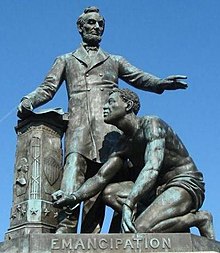| ||
|---|---|---|
|
Personal
Political
16th President of the United States
First term
Second term
Presidential elections
Assassination and legacy
 |
||

Abraham Lincoln's position on slavery in the United States is one of the most discussed aspects of his life. Lincoln frequently expressed his moral opposition to slavery in public and private.[1] "I am naturally anti-slavery. If slavery is not wrong, nothing is wrong," he stated. "I can not remember when I did not so think, and feel."[2] However, the question of what to do about it and how to end it, given that it was so firmly embedded in the nation's constitutional framework and in the economy of much of the country, was complex and politically challenging. In addition, there was the unanswered question, which Lincoln had to deal with, of what would become of the four million slaves if liberated: how they would earn a living in a society that had almost always rejected them or looked down on their very presence.
- ^ Striner, Richard (2006). Father Abraham: Lincoln's Relentless Struggle to End Slavery. Oxford University Press. pp. 2–4. ISBN 978-0-19-518306-1.
- ^ Lincoln, Abraham (April 4, 1864). "Letter to Albert G. Hodges".

